"We must speed up our activities"
Imme Scholz is working with experts from around the world on a UN report to promote the implementation of the 2030 Agenda.

The goals of the 2030 Agenda are clear – but how can they be achieved in the time that remains? A new experts' report aims to provide possible approaches for doing so. UN Secretary-General António Guterres has convened a 15-member panel for the purpose. One of the international experts is Imme Scholz, Deputy Director of the German Development Institute and Vice-Chair of the German Council for Sustainable Development.
Professor Scholz, the next global report on sustainable development you are involved in will be published in 2023. In view of the consequences of the coronavirus crisis, it's not going to be very positive, is it?
Certainly significant setbacks are being predicted, and in some cases they are already visible. Poverty, inequality and hunger have increased and health has deteriorated. With regard to education, we know from studies that if children are taken out of school for a considerable period of time, for example because of wars or conflicts, this has a measurable effect later in terms of income losses. My biggest fear is that the pandemic will also set us back in the field of climate-change mitigation. Many countries in the global South are already overindebted and lack the resources needed to rebuild their infrastructures. The industrialized countries, on the other hand, have large reconstruction and economic-stimulus programmes for the post-coronavirus era that they could also use for the transformation towards greater sustainability – but they often lack the political courage to make the necessary changes.
The report of the UN panel of experts is intended to help policy-makers achieve the Sustainable Development Goals. What is the composition of the group and what is your role?
The panel is made up of experts in the natural and social sciences from all regions of the world. I am co-chairing the meeting together with John Agard from Trinidad and Tobago. Our job is to draw up a new, groundbreaking report. To do this, we want to follow up on the most recent report that came out in 2019. Its key contribution was to group the 17 Sustainable Development Goals into six areas where sustainable development must be advanced: for example sustainable agricultural and food systems, renewable energy supplies, and an economy that produces goods sustainably and creates humane working conditions. The report also defined the levers that must be used in these areas to create systemic change.
Dieses YouTube-Video kann in einem neuen Tab abgespielt werden
YouTube öffnenThird party content
We use YouTube to embed content that may collect data about your activity. Please review the details and accept the service to see this content.
Open consent formWhat levers are they?
Good governance, sustainable economic and financial policies, individual and collective action, and the use of science, technology and innovation. Incidentally, this approach has been incorporated into Germany's new sustainability strategy. In my view, this was possible because Germany's Federal Government has been dealing with sustainability policy since 2002 and has been challenged by committed citizens and experts, for example by the German Council for Sustainable Development (RNE), the Sustainable Development Solutions Network Germany, the Science Platform Sustainability 2030 and the scientific advisory boards of the various federal ministries
Quick facts
Can Germany be a role model in the field of sustainability?
Germany has a high international standing in the field of sustainability, and its word carries a lot of weight. Many people are interested in exchanging ideas with Germany. This is both an opportunity and an obligation: in discussions with international experts who are more closely involved with German sustainability policy, we also hear time and again that they would have expected faster and more ambitious implementation in Germany.
At present, the coronavirus pandemic is making the international exchange of information among experts more difficult. How does the work of the UN body actually function in practice?
We are slightly hampered in our work, of course, because we can't meet physically. The fact that everyone now has a lot of experience with virtual working has certainly helped. But getting together across all time zones is very difficult. We have therefore split up and formed three working groups.
Failure to meet the climate and biodiversity targets in particular would be disastrous.
What topics do they deal with?
The first group looks at the factors that were not yet in focus when the 2030 Agenda was adopted in 2015: for example, the growing trend towards climate neutrality and digitization. The second group is concerned with what can be learned from the coronavirus crisis for the necessary transformation processes in the field of sustainability. This is important because we will have to speed up our activities; otherwise, important time windows will close – in fact, this would have been necessary even if there hadn't been a coronavirus pandemic. The third group is examining how the above-mentioned levers can be defined more precisely and applied more effectively than they have up to now.
Overall, are you optimistic that the goals of the 2030 Agenda can be achieved in time?
We can no longer achieve the target of eradicating extreme poverty by 2030. That isn't just because of the pandemic – progress in this area had already slowed markedly in 2018 and 2019. Of course, the question now is whether we should set priorities: which are the goals that absolutely must be achieved? I would say that failure to meet the climate target and the targets on biodiversity would be particularly disastrous. The longer the negative trends continue in these areas, the harder it will be to stop and reverse them.



